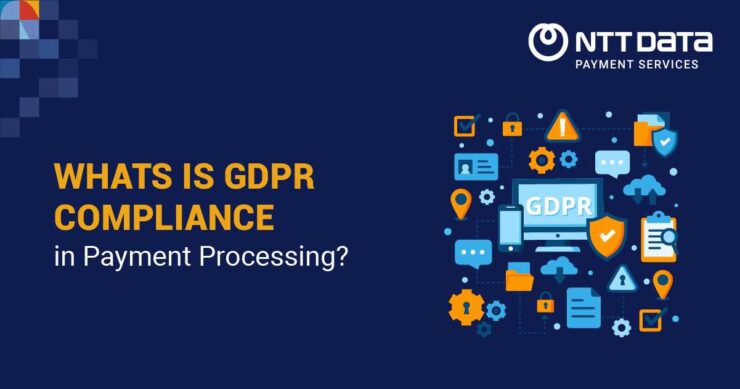
Table of Contents
- 1 Understanding GDPR Compliance in Payment Processing Payment processors handle customers’ sensitive financial and personal information every day. With GDPR, any business processing individuals’ personal data must comply with strict new rules around data protection and privacy.
- 2 What is GDPR Compliance?
- 3 Key Aspects of GDPR Compliance Include
- 4 GDPR and Payment Processing
- 5 Secure Your Online Payments with NTT DATA Payment Services India
- 6 Conclusion
- 7 FAQs
- 7.1 1. What is GDPR? GDPR stands for General Data Protection Regulation. It aims to strengthen and unify data protection for individuals.
- 7.2 2. When did GDPR come into effect? GDPR came into effect on May 24, 2016. Any company processing individuals’ personal data must comply with it.
- 7.3 4. What are the key requirements of GDPR? Key GDPR requirements include obtaining consent, providing access to data, allowing data to be erased, notifying about data breaches, appointing a data protection officer, etc.
- 7.4 5. How does GDPR apply to payment processors? Payment processors need to ensure proper security measures, consent procedures, and individual rights are in place when handling customers’ sensitive financial and personal data.
- 7.5 Latest posts:
- 8 4 Different Types of Micro Payments
- 9 10 Critical Components of a Payment Stack To Know
Understanding GDPR Compliance in Payment Processing
Payment processors handle customers’ sensitive financial and personal information every day. With GDPR, any business processing individuals’ personal data must comply with strict new rules around data protection and privacy.
This includes obtaining proper consent, implementing security measures, notifying about data breaches quickly, and allowing individuals to access and correct their personal information easily. GDPR compliance is crucial for payment processors to continue serving businesses and customers lawfully.
What is GDPR Compliance?
The General Data Protection Regulation (GDPR) is a regulation that handles and protects personal data collected from individuals. Personal data under GDPR is any information relating to an identifiable living person, like names, addresses, payment details, online identifiers, and more.
GDPR compliance requires businesses to have the necessary policies, procedures, and controls in place to meet GDPR standards for collecting, using, storing, and securing personal data.
This includes obtaining proper consent for data uses, providing privacy notices, allowing access and correction rights, reporting data breaches, implementing security safeguards, and more. GDPR compliance is important for all payment processors to avoid hefty fines.
Key Aspects of GDPR Compliance Include
- Obtaining consent for data collection and use. Companies must get explicit consent from individuals before collecting and processing their personal data.
- Providing access to personal data. Individuals have the right to access any data an organisation holds on them. Companies must provide this access upon request.
- Allowing data to be erased. Under the “right to be forgotten,” individuals can request to have their personal data erased. Companies must comply with these requests.
- Notifying about data breaches. If a company suffers a data breach involving EU residents’ information, it must notify affected individuals and local data protection authorities without undue delay.
- Appointing a data protection officer. Larger organisations processing large amounts of personal data must appoint a data protection officer to oversee GDPR compliance.
- Conducting privacy impact assessments. Companies should evaluate the privacy risks of any new products, services or processes involving personal data through impact assessments.
So in summary, “What is GDPR compliance?” boils down to properly obtaining, handling, securing and deleting individuals’ personal data in accordance with their new rights and privacy protections under the law.
GDPR and Payment Processing
For payment processors, GDPR compliance focuses on properly handling customers’ sensitive financial and personal information obtained during online and card-not-present payment transactions.
This includes names, addresses, payment card details, bank details, and digital identifiers. Payment processors must ensure they have the right security, policies, and processes in place to protect this data in compliance with GDPR.
Areas of focus for GDPR compliance in payment processing include:
- Encrypting all payment information in transit and at rest using strong encryption
- Restricting access to payment data only to authorised personnel
- Allowing customers to access, correct, or delete their payment profiles easily
- Notifying customers and regulators of any payment data breaches
- Obtaining proper, verifiable consent for the use of payment data for additional purposes
- Implementing security controls like firewalls, malware protection, access controls, and regular audits
Secure Your Online Payments with NTT DATA Payment Services India
NTT DATA Payment Services India offers a complete payment solution to advance both your offline and online businesses. From online payment gateways and POS machines to IVR payments and Bharat QR Scan and Pay, we ensure maximum comfort, convenience, and safety for all your payments.
Conclusion
GDPR compliance presents both challenges and opportunities for payment processing companies. However, making the necessary investments to protect personal data and respect individual privacy rights properly is crucial both legally and in maintaining customer relationships in the digital economy.
By partnering with a GDPR-compliant payment processor, merchants can focus on growing their business while meeting all GDPR requirements for securely processing payments.
FAQs
1. What is GDPR?
GDPR stands for General Data Protection Regulation. It aims to strengthen and unify data protection for individuals.
2. When did GDPR come into effect?
GDPR came into effect on May 24, 2016. Any company processing individuals’ personal data must comply with it.
3. What types of data does GDPR cover?
GDPR covers any personal data that can directly or indirectly identify a living individual. This includes names, addresses, photos, email addresses, bank details, posts on social media, medical information, IP addresses, etc.


